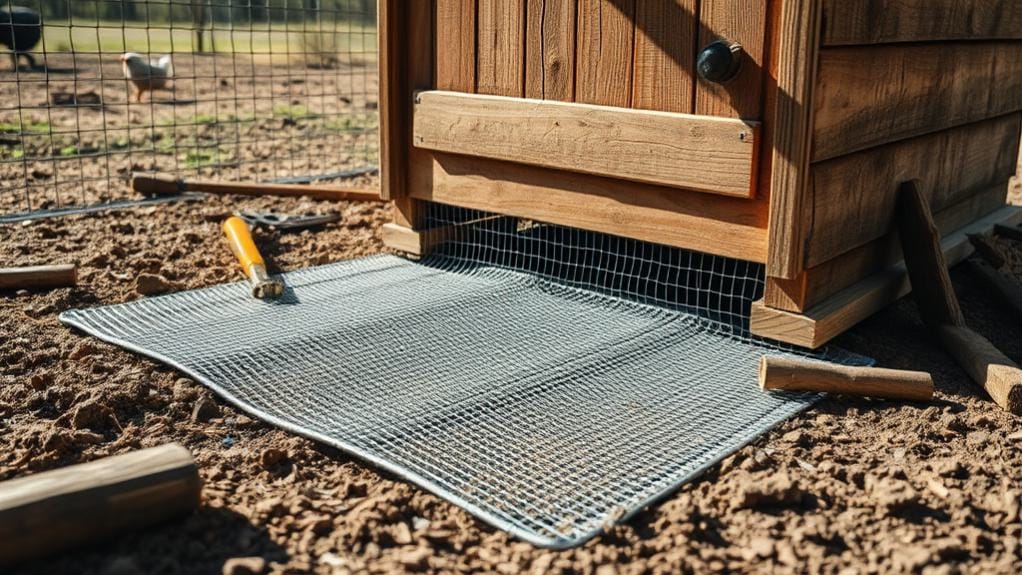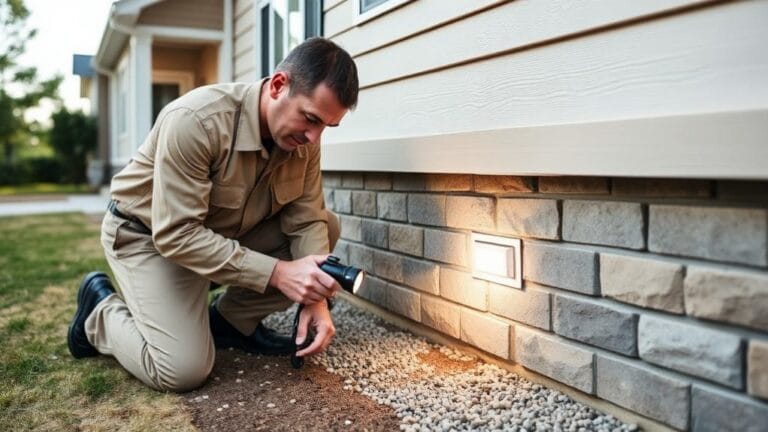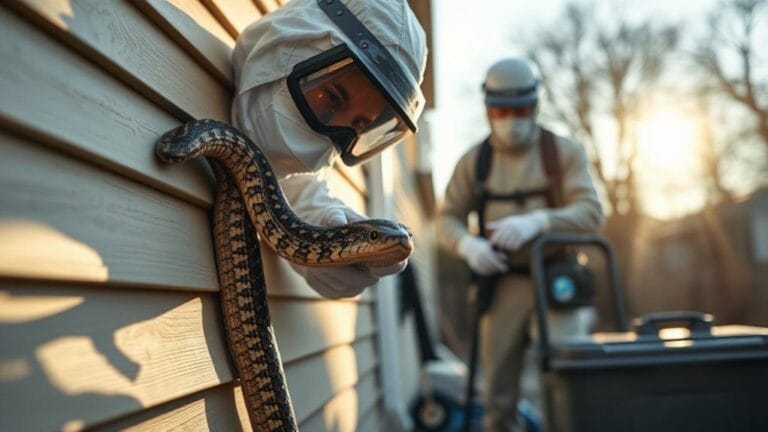Want to keep those slithery invaders away from your chickens? Start by clearing all debris and tall grass around your coop – snakes love hiding spots. Install hardware cloth (not chicken wire!) with holes smaller than 0.5 cm, burying it 12 inches deep. Seal every crack larger than half an inch, elevate your coop, and store feed in metal containers to avoid attracting rodents. You'll need daily perimeter checks and immediate repairs of any damage. Create a 3-foot barrier zone and maintain strict cleanliness. But that's just scratching the surface of serious snake-proofing strategy.
Clear Surrounding Debris
Table of Contents
Tackling the area around your chicken coop is your first line of defense against unwanted snake visitors.
Let's be honest – if you're keeping your coop's surroundings looking like a jungle, you're basically rolling out the red carpet for sneaky serpents.
Since snakes are most active during daylight hours, daytime maintenance is your best opportunity to spot and address potential hiding spots.
Here's what you need to clear away (and yes, I mean right now):
- Those old logs you've been meaning to move since last spring
- That "vintage" equipment you swear you'll fix someday
- The grass that's gotten so tall it's practically waving hello
Pro tip: I recommend doing a weekly sweep of your coop area. Trust me, it's better than the surprise of finding a snake doing its own inspection.
Keep the entire area visible and tidy.
The less cover snakes have, the less likely they'll stick around for an extended stay at your chicken resort.
Install Hardware Cloth
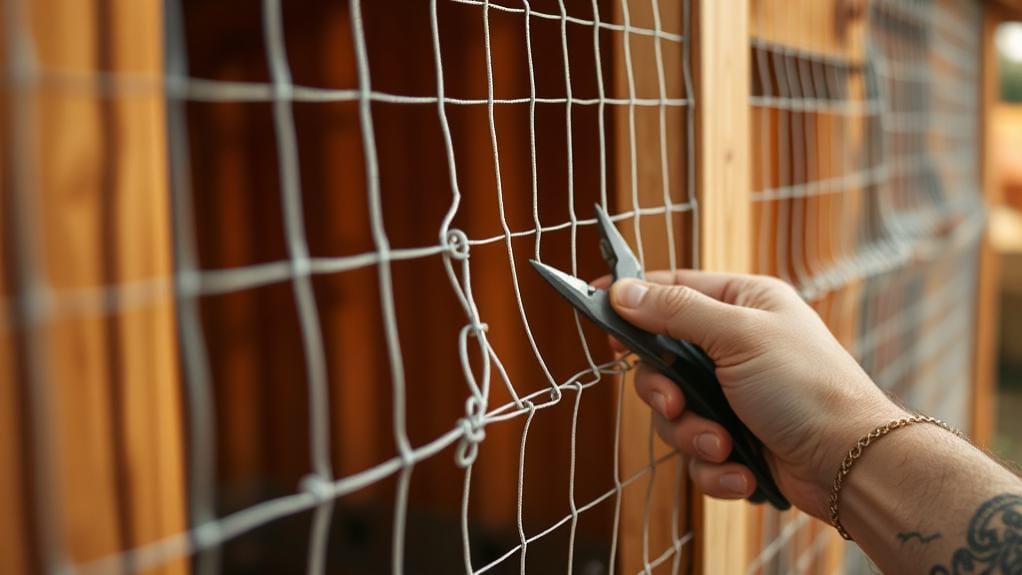
Now that you've cleared the surrounding area, hardware cloth stands as your coop's most powerful defense against slithering intruders.
Trust me – you'll want to get this right the first time unless you enjoy midnight visits from hungry snakes.
Amagabeli galvanized wire is a top choice, offering 7+ years of reliable protection against persistent predators.
To properly snake proof your coop area:
- Use hardware cloth with holes smaller than 0.5 cm – because even baby snakes are opportunists
- Choose 19-gauge or stronger material – flimsy mesh won't cut it
- Bury it 12 inches deep around the entire perimeter
- Secure every edge with screws or staples – no shortcuts!
*Pro tip: Keep snakes away by checking your hardware cloth monthly for damage. One small hole is all it takes for a determined snake to crash your chickens' party.
Replace worn sections immediately – no excuses!*
Seal All Entry Points
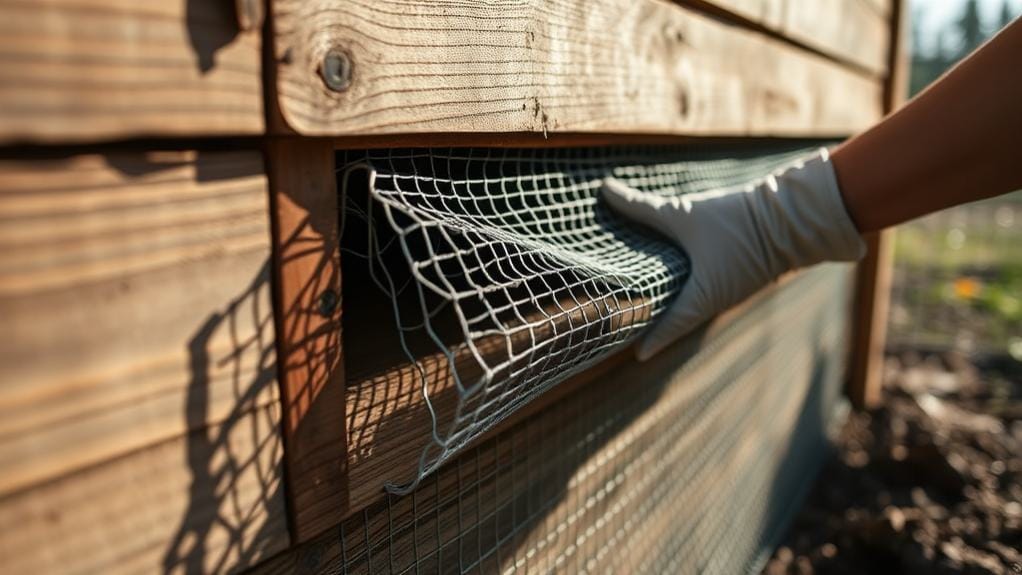
Three critical areas demand your attention when sealing entry points: doors, windows, and the coop's foundation joints.
Let's face it – if your coop has more holes than Swiss cheese, you're basically running a snake buffet. Using simple caulk sealing on any cracks will greatly improve your protection against these unwanted visitors.
Don't even think about using chicken wire. It's about as effective as a screen door on a submarine. Hardware cloth is your best friend here.
Every gap larger than half an inch needs immediate attention – yes, even that tiny crack you've been ignoring.
Pro Tip: Inspect your coop weekly. Snakes are opportunists who'll exploit the smallest weakness.
I can't stress this enough: seal those entry points like your chickens' lives depend on it – because they do.
Pay special attention to:
- Foundation gaps
- Worn door frames
- Utility access points
Your vigilance today prevents unwanted guests tomorrow.
Maintain Proper Feed Storage

Getting your feed storage right is the backbone of effective snake prevention. Like Dachshund hunting instincts, proper feed control helps track and deter unwanted visitors.
Listen up – those metal barrels aren't just for show. They're your first line of defense against rodents, and where there are no rodents, there are no snakes. It's that simple.
Here's what you absolutely must do:
- Store all chicken feed in metal containers. No exceptions.
- Pull those feeders in at night. Seriously, don't be lazy about this.
- Clean up spilled feed like your coop depends on it (because it does).
- Remove water sources after dark.
Pro Tip: Set up a strict feeding schedule. Your chickens won't starve if they can't free-feed 24/7, but you might just find unwanted dinner guests if you leave food out constantly.
Remember: proper feed storage isn't just about keeping your feed fresh – it's about keeping those sneaky snakes away from your flock.
Elevate The Coop
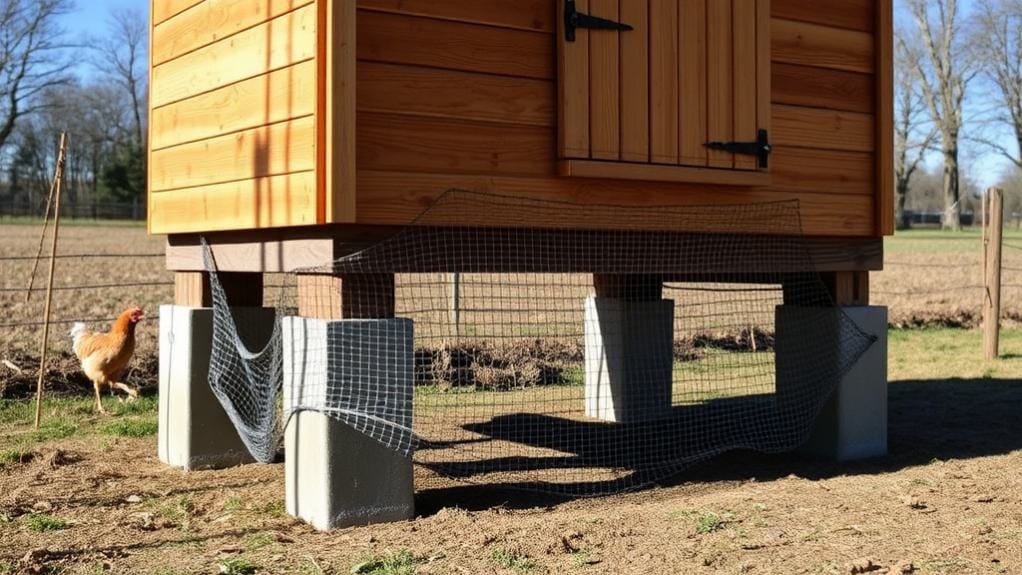
Lifting your chicken coop off the ground isn't just a design choice – it's a critical defense against snake invasions. Much like basements and cellars, low areas provide the perfect hiding spots for snakes seeking shelter and food sources.
By elevating the chicken coop at least 12 inches, you'll make those slithery visitors think twice before trying to grab a midnight snack. Trust me, snakes hate working harder than they've to. When you raise that coop, you're basically telling them "Sorry, no easy meals here!"
Make sure you:
- Install sturdy legs that won't wobble or warp
- Add a solid floor (because snakes are sneaky like that)
- Keep the height consistent all around
*Pro Tip: Snake-proofing isn't a set-it-and-forget-it deal. You'll need to check regularly for wear and tear that could compromise your defenses.
Those gaps you ignore today might be your worst nightmare tomorrow.
Implement Rodent Control Measures
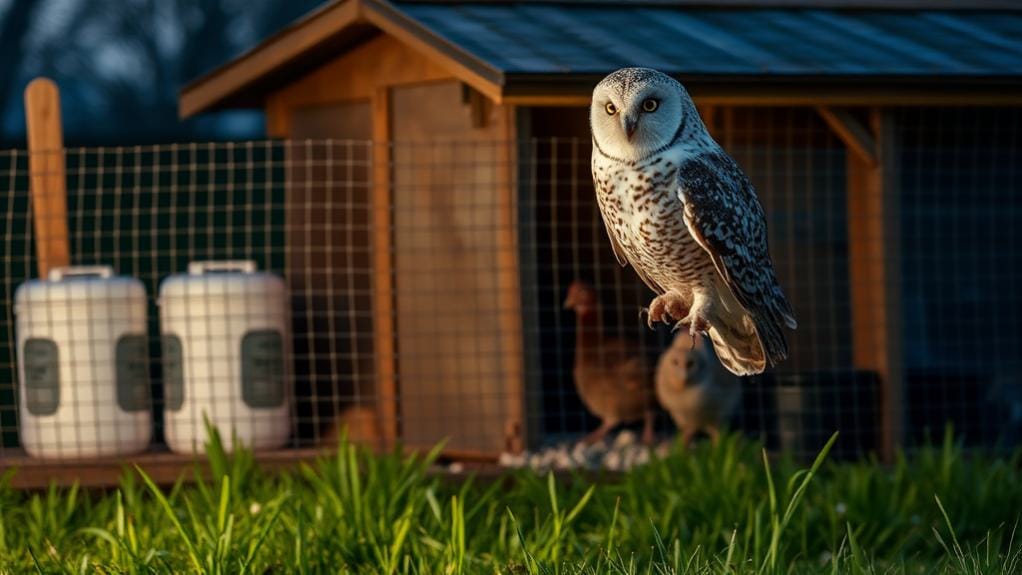
Rodent control stands as your frontline defense against unwanted snake visitors.
Let's be honest – if you're leaving chicken feed scattered everywhere, you might as well put up a "Snake Buffet" sign.
I'll show you how keeping snakes away starts with smart rodent-proof storage and proper feeding practices.
Here are your must-do tasks to avoid turning your coop into a rodent resort:
- Store all chicken feed in heavy-duty rodent-proof containers – no exceptions!
- Bring feeders inside at night (yes, every single night)
- Clean up spilled feed immediately – those "just a few pieces" add up
Pro tip: Remove water sources overnight too. Those midnight-snacking rodents get thirsty, and where there's a mouse party, there's bound to be a snake crasher.
Don't slack on monitoring for rodent activity.
If you spot droppings, act fast!
Check For Structural Weaknesses
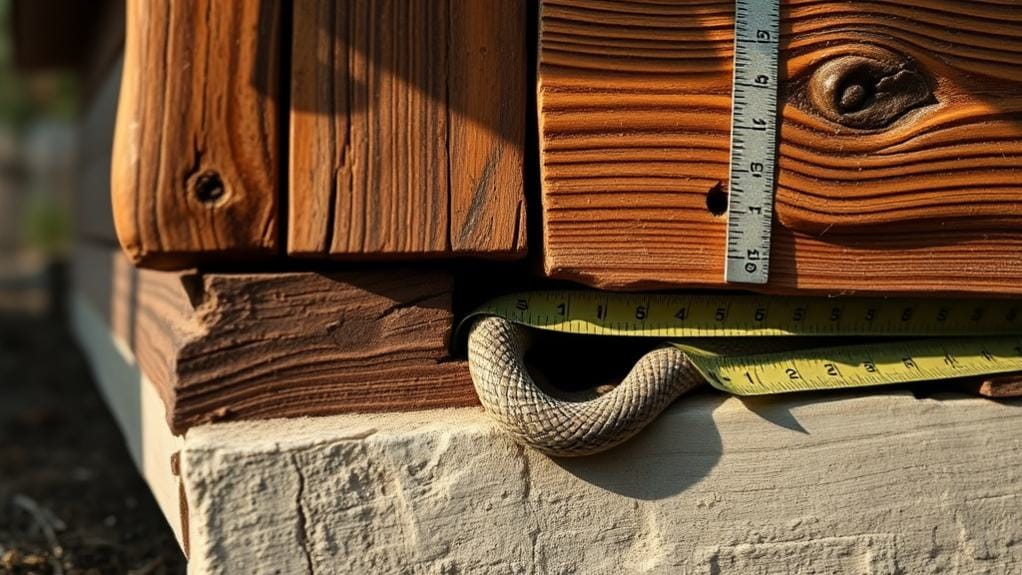
With your rodent situation under control, it's time to focus on your coop's weak spots – the physical vulnerabilities that practically invite snakes inside.
I'll be blunt: You need to inspect the chicken coop like a building inspector with OCD. Get down on your hands and knees if you have to. Check for wear and tear everywhere, especially after those lovely storms that love to wreck your hard work.
Here's what you're hunting for:
- Gaps or holes bigger than half an inch (yes, snakes are basically liquid)
- Loose doors and windows (they're stronger than they look)
- Damaged fencing (one weak spot is all it takes)
*Pro Tip: Don't just patch entry points with duct tape and call it a day. Use solid materials like metal or plywood. Those sneaky serpents will test every inch of your handiwork.*
Create Barrier Zones
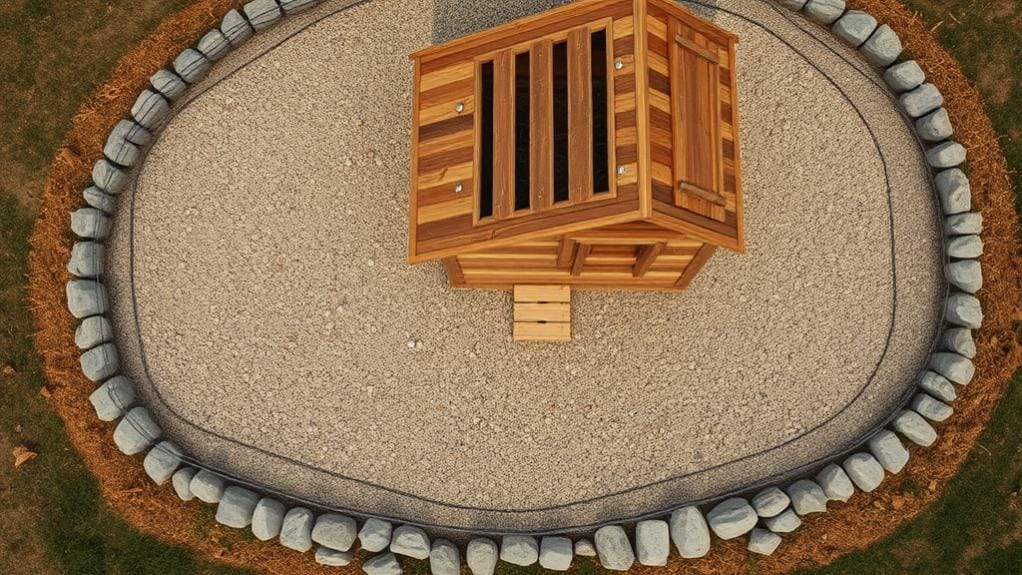
Snake-proofing success depends on creating a no-man's-land around your coop.
I'll show you how to create barrier zones that'll make snakes think twice before slithering near your chickens.
Start with these essential steps (yes, you really need to do all of them):
- Clear a 3-foot strip around your chicken coop – no tall grass, no debris, no snake hideouts
- Install solid fencing that's 4 feet high and buried 12 inches deep (snakes aren't stupid, they'll try to dig)
- Add hardware cloth with tiny holes (under 0.5 cm) for ventilation without vulnerability
Pro Tip: Toss some gravel around the perimeter. It's not just for looks – it makes sneaky snakes easier to spot and harder to move around.
And please, check those barriers regularly. One weak spot is all it takes for an unwanted visitor to crash your coop party.
Monitor Coop Perimeter Daily
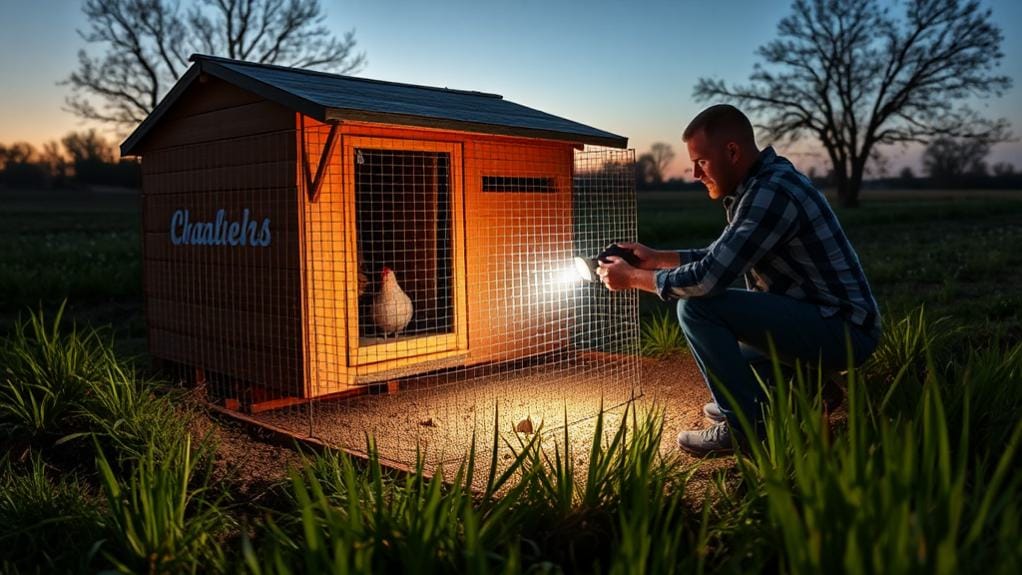
Daily vigilance is your best defense against unwanted serpentine visitors.
Let's face it – snakes are sneaky, and they'll take advantage of any oversight in your coop perimeter monitoring. Trust me, you don't want to learn this lesson the hard way.
Here's your daily snake patrol checklist:
- Circle the entire coop looking for fresh snake skin, disturbed soil, or new holes
- Check for gaps larger than ½ inch (yes, they can squeeze through that!)
- Clear away debris and trim vegetation – snakes love hiding spots
- Look for rodent activity because where there are mice, snakes will follow
Pro Tip: Set up trail cameras or create track strips in the dirt around your coop. These preventative measures help you spot signs of snake activity before it's too late.
No shortcuts here – daily monitoring could save your flock's lives.
Replace Damaged Materials Immediately
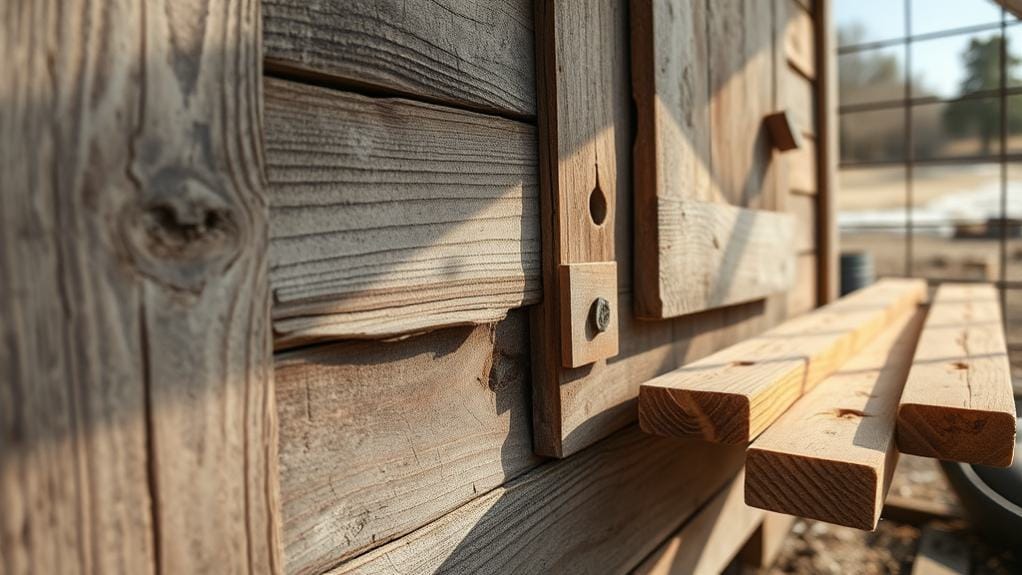
A broken board or torn wire mesh might as well be a welcome sign for snakes. I'm serious – you need to replace damaged materials immediately when you spot them.
Don't think that tiny hole isn't a problem. Trust me, if a snake can fit its head through, the rest will follow.
Here's what you need to focus on replacing right away:
- Hardware cloth or mesh with even the smallest tears (snakes don't need your procrastination)
- Rusty or loose fencing sections (they're basically snake highways)
- Any boards with splits or gaps larger than half an inch (yeah, that's all it takes)
*Pro tip: Keep spare materials on hand for emergency repairs. You don't want to be running to the hardware store while a snake's eyeing your chicken buffet.*
Frequently Asked Questions
How to Make a Chicken Coop Snake Proof?
I'll help you snake-proof your coop. Seal all gaps over 1/4 inch, use hardware cloth with tiny openings, keep the area clean, store feed properly, and elevate the coop with a solid floor.
What Is the Best Snake Repellent Safe for Chickens?
I've found garlic juice and sulfur to be the most effective natural snake repellents that won't harm your chickens. I recommend mixing them with vinegar and spraying around the coop's perimeter every few weeks.
What Can I Plant Around My Chicken Coop to Keep Snakes Away?
I used to worry about snakes until I discovered nature's repellents. Now I plant garlic, mint, rosemary, and citrus around my coop. I'll even add thorny bushes and lavender for extra protection.
What Size Chicken Wire to Keep Snakes Out?
I recommend using hardware cloth with 1/4-inch or smaller openings instead of chicken wire. If you must use chicken wire, choose one with openings no larger than 0.5 cm to effectively block snakes.
Last Word
Snake-proofing your coop isn't a one-and-done deal – it's more like an ongoing game of chess where you're always thinking three moves ahead. I've shown you the essential steps, but staying vigilant is your best defense. Check those defenses daily, fix issues immediately, and don't get lazy with feed storage. Your chickens are counting on you to keep those slithering visitors out. Remember: a secure coop means peaceful sleep for everyone.

